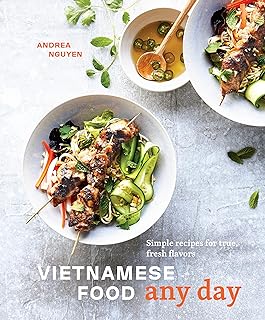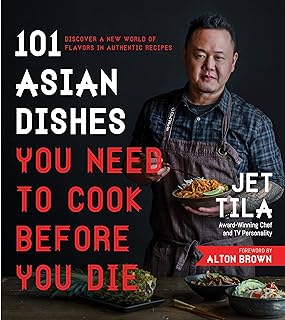5 important factors worth considering when looking for the best asian cookbooks
As the world of cooking continues to explore a variety of flavors and techniques, Asian cookbooks play a vital role in every kitchen. These cookbooks go beyond just recipes, providing a window into deep-rooted traditions, diverse cultures, and a wide range of flavors to discover. When looking to buy an Asian cookbook, it’s important to go beyond the ingredients and instructions and uncover the stories, heritage, and key principles that influence Asian cuisine.
In this article, we will explore the essential factors that go beyond just recipes in Asian cookbooks. These cookbooks can enhance not only your cooking skills but also your understanding and appreciation of the rich and diverse world of Asian cuisine.
See our guide to the best asian cookbooks.
Cuisine type (e.g. Chinese, Japanese, Thai)
When exploring Asian cuisine and deciding which cookbooks to add to your collection, choosing between Chinese, Japanese, or Thai cookbooks can be overwhelming. Each type of cuisine has its own distinct flavors, cooking methods, and cultural influences that make it an exciting experience to discover. Chinese cuisine is known for its bold stir-fries, flavorful sauces, and ingredients like Szechuan peppercorns and soy sauce. Japanese cuisine, on the other hand, focuses on precision, delicate flavors, and beautiful presentation, with dishes like sushi, sashimi, and ramen being popular worldwide. Thai cuisine offers a mix of sweet, sour, salty, and spicy flavors, providing a dynamic dining experience with dishes like Pad Thai, Green Curry, and Tom Yum soup. When choosing Asian cookbooks, consider your food preferences and dive into a journey that not only satisfies your taste buds but also deepens your appreciation for different culinary traditions.
Level of difficulty (beginner, intermediate, advanced)
Buying Asian cookbooks can be an adventure. Beginner cookbooks are great for people just starting to explore Asian cuisine. They have easy recipes and step-by-step instructions. These cookbooks focus on basic techniques and common ingredients, so they’re perfect for home cooks trying out new flavors. As you move to intermediate cookbooks, the recipes get more complex and the flavors more varied. These books explore regional specialties, traditional cooking methods, and a wider range of ingredients. Advanced cookbooks are for experienced cooks. They have intricate recipes, complex flavors, and advanced techniques that highlight the best of Asian cuisine. These books challenge skilled cooks to try new things and experience the delights of Asian cooking at its highest level.
Authenticity of recipes
When looking to buy Asian cookbooks, it’s important to be cautious about how authentic they are. There are many cookbooks claiming to have real Asian recipes, which can make you question if they are accurate. In today’s world, different cooking styles can mix together, blurring the line between what’s traditional and what’s been changed. That’s why it’s important to check the author’s background, knowledge, and if they stick to traditional ways of cooking when choosing a cookbook. By learning about where the recipes come from and the cultural details, you can truly understand and enjoy the authentic dishes.
Some modern cookbooks try to make traditional Asian recipes simpler or more appealing to Western tastes. While this can make the dishes more popular with a wider audience, it often means losing the authentic Asian flavors. To really appreciate the variety of Asian tastes and cooking methods, it’s best to find cookbooks that focus on keeping traditional recipes true to their roots. When you support authors who deeply understand and honor the cultural background of each dish, you can go on a culinary adventure that goes beyond just eating food and becomes a true celebration of the authenticity and diversity of Asian cuisine.
Availability of ingredients
When you buy Asian cookbooks, you might see tempting recipes that promise to take you on a flavorful journey. The ingredients you can find easily are important. Authors need to balance keeping dishes authentic while still being practical. Some people enjoy hunting for rare spices and special ingredients, but many cooks want recipes with easy-to-find items. So, cookbooks with a mix of traditional ingredients and substitutes can appeal to more people.
Globalization has made it easier to get ingredients from around the world, allowing cooks to try new flavors and techniques. But there is a debate about whether dishes should stay true to their roots or be adapted. Some say recipes should stick to traditional ingredients, while others believe changes reflect cultural exchange and innovation. The variety of ingredients in Asian cookbooks shows how adaptable and inclusive they are, blending traditional and modern influences in cooking.
Cooking techniques and methods
As you explore Asian cuisine through cookbooks, you’ll discover a world of cooking techniques and methods. Each book shares traditions that have been passed down for generations, giving you a peek into different cultures. From the precise cutting in Japanese sashimi to the bold flavors of Sichuanese cuisine, these cookbooks offer more than just recipes – they help you understand diverse culinary backgrounds.
What makes Asian cookbooks special is that they go beyond just giving recipes. They let home cooks experience the art and skill behind each dish. Whether it’s the perfect blend of flavors in Thai curries or the exact timing for dim sum, Asian cooking is all about attention to detail. By learning these techniques, you’ll embark on a culinary journey that’s about more than just taste – it’s about appreciating the craftsmanship and expertise behind Asian cuisine.
Conclusion
Asian cookbooks offer a wide variety of recipes that reflect the rich heritage and delicious flavors of Asian cuisine. These cookbooks take us on a culinary journey through bustling markets, serene tea fields, and aromatic spice bazaars. By exploring the intricate recipes in these books, we not only improve our cooking skills but also gain a deeper understanding and appreciation for the blending of tradition and innovation in Asian cooking. Through the flavors, textures, and aromas found in these recipes, we are invited to experience a timeless exploration of Asian cuisine that extends beyond the kitchen. Want more info on cordless heated blanket, check the best cordless heated blanket.

